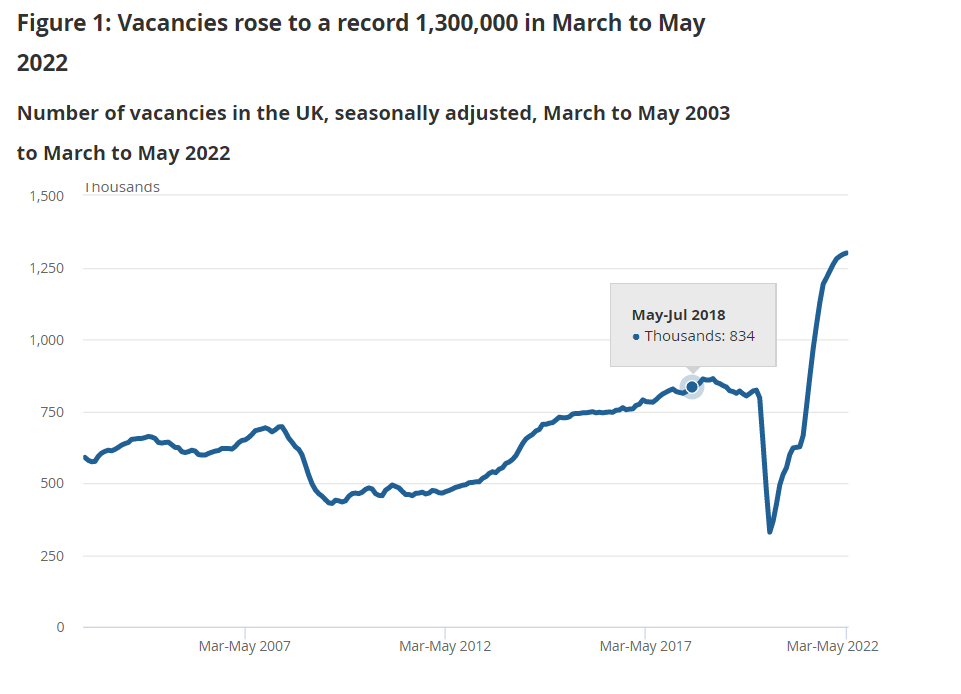Time to rethink your recruitment?
Updated 25th May 2023 | 5 min read Published 19th July 2022

Could it be time to rethink your recruitment strategy?
With a record number of vacancies now available for candidates to choose from in-house recruitment teams across the UK are currently trying to navigate a highly saturated and therefore competitive environment in order to secure talent and fill vital vacancies across their organisations.
For many, despite the chaos and urgency, it's the perfect time to stop, and potentially re-think your recruitment strategy to ensure that you not only maximise your efforts now but also in the future too!
Understanding the true extent of the issue is key to moving forward.
According to the ONS, during the period of March to May 2022 there were over 1,300,000 vacancies advertised by organisations in the UK. This figure has continued to rise to unprecedented levels following the slump of April - June 2020 as a result of the global pandemic.

Whilst the UK has a workforce of over 32.7 million people employed, the actual number of active jobseekers equates to just 5 - 15% of this talent pool. To put this in perspective, that equates to a maximum of 4,906,000 potential candidates for 1.3 million job opportunities i.e. just over 3.5 candidates for every role. Add to this the skills shortages and increased expectations of candidates and it's clear to understand the pressures being faced by in-house recruitment teams to essentially re-think their recruitment strategy.
So what do organisations need to be doing?
Here are our top 5 tips for consideration:
TIP 1: Review your current attraction strategies and look at ways to engage passive candidates as well as active job seekers.
With so few active job seekers compared to live vacancies, organisations need to look at different methods to tap into the extra 27 million potential candidates that are currently employed but not actively looking for a new role.
Social media is often a primary consideration for reaching such huge pools of potential talent. However, simply posting jobs on your corporate page and hoping that you will reach thousands of users simply isn't going to work. Unless you have a mega-following of course but even then the idea is to reach outside of your normal talent pools.
Harnessing the power of sponsored advertising and geo-targeting using platforms such as Facebook, Instagram, LinkedIn and Twitter are key. Find out how here
TIP 2: Ensure that the tools you have in place are allowing you to deliver the best possible candidate experience, drive process efficiency and positively promote your employer brand
Candidates expect so much more from employers post-pandemic and every aspect of your recruitment process needs to be revised in terms of how a candidate would perceive your organisation and opportunities over that of a competitor. If an active job seeker applies for your role, then the chances are that they have applied elsewhere too, but for passive candidates, you need to ensure that you demonstrate why they should leave their current employer too!
What makes you stand out from your competitors? What can you do to entice people to want to work for your organisation? Are your processes the best that they can be?
Technology evolves at a rapid pace and you need to ensure that your software helps you deliver the best possible impression of your organisation - every time!
TIP 3: Use reporting metrics and insight data to make more informed decisions in terms of your attraction strategies and processes
Determining which platforms you use to advertise your vacancies should always be based on factual evidence rather than just because you think you should be advertising on a particular channel as it's something you have always done.
Use hard facts to make informed decisions about not only where your applications come from but your recent hires too. Unless you have an unlimited recruitment budget then you need to focus on what platforms have helped you fill vacancies previously. Receiving large volumes of applications from one source is all well and good but if you never end up hiring from it then is it really an effective use of your time and resource?
Having the reporting tools at your disposal will help make and justify your decisions much much easier.
TIP 4: Improve working relationships with your hiring managers to help speed up the process and secure top talent quickly.
Top talent won't be around for long, especially if they are actively seeking another opportunity. It is therefore imperative to establish simple but workable processes with your hiring managers to ensure that quality candidates are shortlisted, interviewed and hired in the quickest possible manner.
Reviewing the first couple of applications you receive to assess the suitability of candidates being attracted early doors will help ensure that your focus is on delivering what hiring managers are actually looking for, whilst pre-booking interview times will help to speed up the interview process even further.
TIP 5: Collate feedback from all parties to create a continuous cycle for improvement.
The only way to enhance your recruitment process is to talk to the people involved. Regardless of what you may think of your recruitment process, there will always be room for improvement and it is vital to speak to all parties to get a clear understanding not only of the potential barriers but also the opportunities you could capitalise on.
For example, Does your current process reflect those who want to work from home and conduct all activities remotely? Are you reaching out enough to your talent pool? How long did your application process take to complete? Was it achievable using a smartphone?
It's important also to try and get an unbiased view, so rather than simply concentrate on those who have been successfully offered the role, try and reach out to your talent pool as these will give you a much broader understanding of how others perceive your processes.
Summary
Regardless of your industry, size of organisation, or recruitment volumes, the one thing that we can all recognise is that recruitment has and continues to change. In-house recruitment teams are battling an extremely competitive and time-sensitive candidate market which is only exasperated by a global skills shortage across many sectors and disciplines.
Is it time to rethink your recruitment? Our IRIS networx solutions can help!





